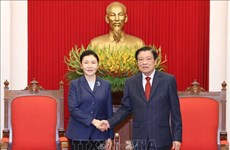Vietnam highlights regional connectivity at ESCAP session
Vietnam has emphasised the importance of a peaceful and stable
environment, including free and safe maritime navigation and the
peaceful settlement of disputes at sea based on respect for
international law and regional commitment, to regional connectivity in
the Asia Pacific.
Vietnam has emphasised the importance of a peaceful and stable
environment, including free and safe maritime navigation and the
peaceful settlement of disputes at sea based on respect for
international law and regional commitment, to regional connectivity in
the Asia Pacific.
Addressing the plenary session of the phase II of the 70th session of the Economic and Social Commission for Asia and the Pacific (ESCAP), running from August 4-8 in Bangkok , Thailand , Deputy Foreign Minister Ha Kim Ngoc said peace and stability are pre-requisite to development and integration of every nation and the whole region.
He hailed ESCAP’s contributions to promoting regional connectivity, and asked the commission to continue practical support to ASEAN countries to close development gap, implement the Master Plan on ASEAN Connectivity and promote the ASEAN connectivity with the rest of the Asia-Pacific.
The Vietnamese representative also called on ESCAP to continue supporting Vietnam in economic integration towards sustainable and inclusive growth, developing the country’s connectivity with the region through economic corridors, for example, the East-West Economic Corridor (EWEC) and the Southern Economic Corridor (SEC).
For its part, Vietnam will continue its strong cooperation with ESCAP and other members towards the shared goals of the region, he added.
Speaking at the debate on sustainable development, Deputy FM Ngoc affirmed that sustainable growth is one of fundamental principles in Vietnam ’s socio-economic development strategy, adding that the country expects to receive more support from ESCAP in fulfilling the remaining millennium development goals by 2015 and carry out targets in UN’s post-2015 development agenda.
In opening the ESCAP’s 70th sesssion, United Nations Under-Secretary-General and ESCAP Executive Secretary, Dr. Shamshad Akhtar noted that with a forecast growth of under 6 percent, coupled with increasing development, environmental and social challenges, regional countries should strengthen financial resources for development, ensuring social welfare, reforming institutions, enhancing integration capacity and exploiting regional connectivity.
She said that after almost 70 years of operation, it is now time for ESCAP to reform with focus on building close ties with the ASEAN as well as other regional institutions, while continuing its contributions to the process of implementing sustainable development goals and post-2015 development roadmap.
During the sessions, representatives from member nations and scholars discussed ways to boost sustainable development, post-2015 orientations as well as measures to foster regional connectivity via four main areas of trade, transportation, information and communication technology, energy and human linkage.
They approved 12 resolutions aiming to boost regional cooperation in economics, trade, infrastructure and environment.
On the sidelines of the event, ESCAP also introduced the UN Economic and Social Survey for Asia and the Pacific 2014, forecasting an average growth of 5.8 percent for this year.
Southeast Asian economies still face many difficulties, with an average 4.6 percent growth projected for 2014, lower than the 4.9 percent rate in 2013 and 5.5 percent in 2012, it said.
The survey assessed that the Vietnamese economy is changing positively with a projected growth of 5.9 percent for 2014.
ESCAP statistics also showed that Vietnam is leading ASEAN members in investing in social security, spending 5 percent of its GDP on the work against the average investment of 1-3 percent.
Established in 1947, the Bangkok-based ESCAP is one of five regional commissions of the UN. It currently consists of 53 member states and nine associate members.-VNA
Addressing the plenary session of the phase II of the 70th session of the Economic and Social Commission for Asia and the Pacific (ESCAP), running from August 4-8 in Bangkok , Thailand , Deputy Foreign Minister Ha Kim Ngoc said peace and stability are pre-requisite to development and integration of every nation and the whole region.
He hailed ESCAP’s contributions to promoting regional connectivity, and asked the commission to continue practical support to ASEAN countries to close development gap, implement the Master Plan on ASEAN Connectivity and promote the ASEAN connectivity with the rest of the Asia-Pacific.
The Vietnamese representative also called on ESCAP to continue supporting Vietnam in economic integration towards sustainable and inclusive growth, developing the country’s connectivity with the region through economic corridors, for example, the East-West Economic Corridor (EWEC) and the Southern Economic Corridor (SEC).
For its part, Vietnam will continue its strong cooperation with ESCAP and other members towards the shared goals of the region, he added.
Speaking at the debate on sustainable development, Deputy FM Ngoc affirmed that sustainable growth is one of fundamental principles in Vietnam ’s socio-economic development strategy, adding that the country expects to receive more support from ESCAP in fulfilling the remaining millennium development goals by 2015 and carry out targets in UN’s post-2015 development agenda.
In opening the ESCAP’s 70th sesssion, United Nations Under-Secretary-General and ESCAP Executive Secretary, Dr. Shamshad Akhtar noted that with a forecast growth of under 6 percent, coupled with increasing development, environmental and social challenges, regional countries should strengthen financial resources for development, ensuring social welfare, reforming institutions, enhancing integration capacity and exploiting regional connectivity.
She said that after almost 70 years of operation, it is now time for ESCAP to reform with focus on building close ties with the ASEAN as well as other regional institutions, while continuing its contributions to the process of implementing sustainable development goals and post-2015 development roadmap.
During the sessions, representatives from member nations and scholars discussed ways to boost sustainable development, post-2015 orientations as well as measures to foster regional connectivity via four main areas of trade, transportation, information and communication technology, energy and human linkage.
They approved 12 resolutions aiming to boost regional cooperation in economics, trade, infrastructure and environment.
On the sidelines of the event, ESCAP also introduced the UN Economic and Social Survey for Asia and the Pacific 2014, forecasting an average growth of 5.8 percent for this year.
Southeast Asian economies still face many difficulties, with an average 4.6 percent growth projected for 2014, lower than the 4.9 percent rate in 2013 and 5.5 percent in 2012, it said.
The survey assessed that the Vietnamese economy is changing positively with a projected growth of 5.9 percent for 2014.
ESCAP statistics also showed that Vietnam is leading ASEAN members in investing in social security, spending 5 percent of its GDP on the work against the average investment of 1-3 percent.
Established in 1947, the Bangkok-based ESCAP is one of five regional commissions of the UN. It currently consists of 53 member states and nine associate members.-VNA













